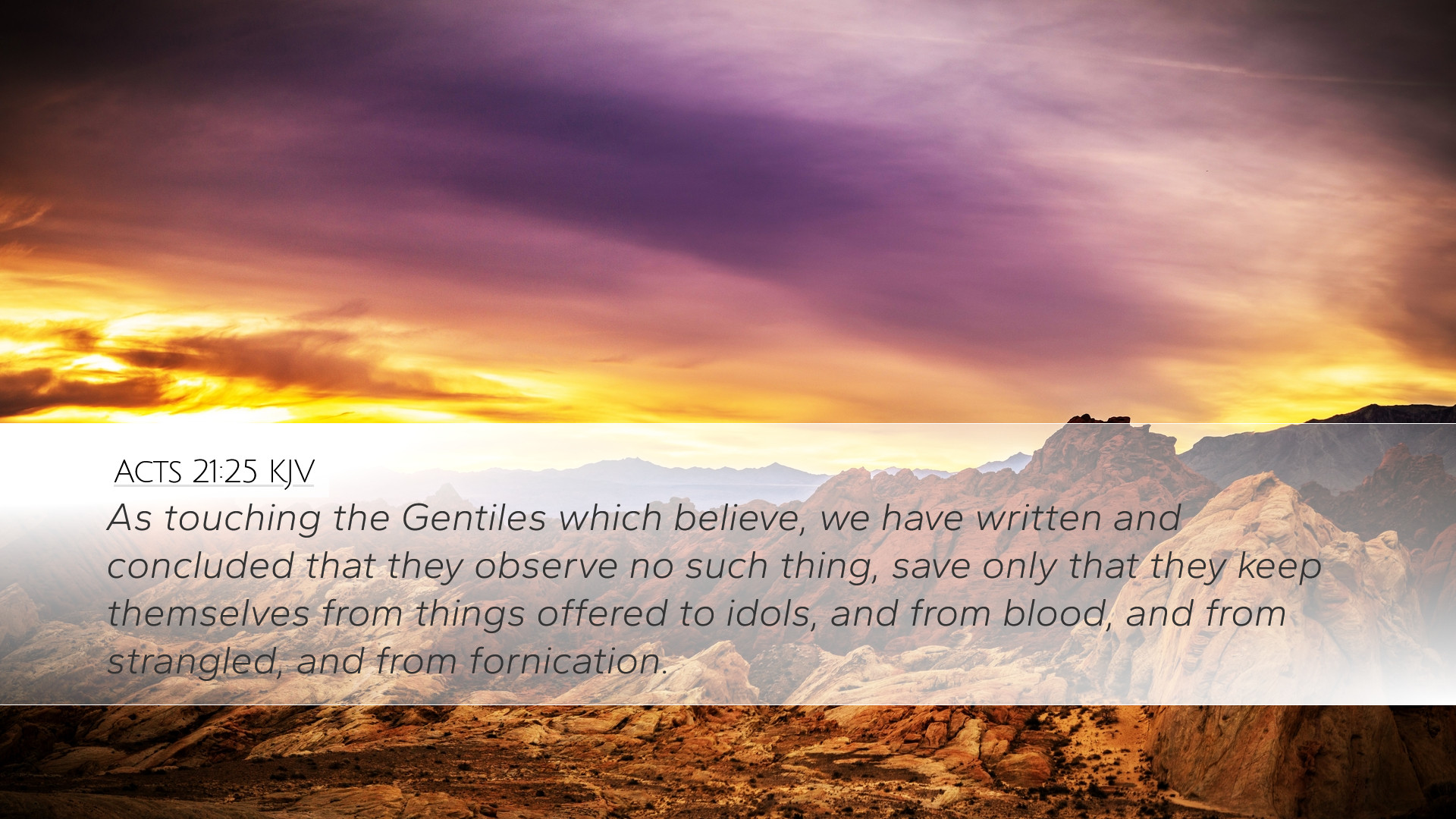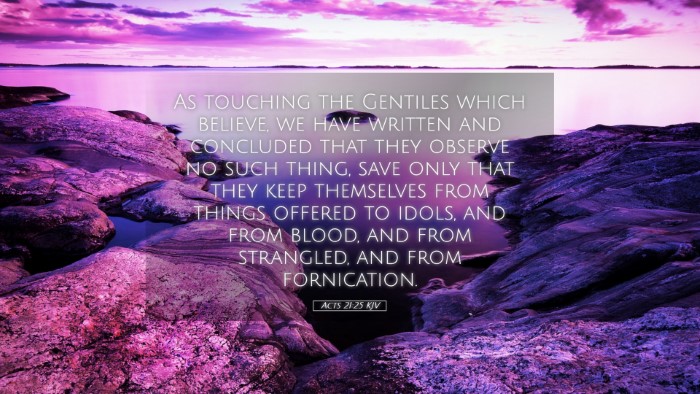Commentary on Acts 21:25
This verse comes at a pivotal moment in the book of Acts, where the Apostle Paul addresses the assembly that is in confusion and distress over the issue of whether Gentile believers must adhere to the Mosaic Law. In Acts 21:25, we read:
"But as touching the Gentiles which believe, we have written and concluded that they observe no such thing, save only that they keep themselves from things offered to idols, and from blood, and from strangled, and from fornication."
Contextual Understanding
The backdrop of this directive is the Jerusalem Council, where the leading apostles and elders gathered to discuss the implications of the acceptance of Gentiles into the Christian faith. There was a decisive move to affirm that salvation comes through grace, not through adherence to the Law.
Insights from Commentaries
Matthew Henry's Commentary
Matthew Henry emphasizes the significance of this decision by the apostles and elders as it illustrates the inclusive nature of the Gospel. He outlines the essential core of the faith being that adherence to the law is not necessary for salvation, indicating that God’s grace is available to all, irrespective of their cultural or religious background.
Henry further notes that the restrictions placed upon the Gentiles were not given as measures necessary for salvation, but rather as practical guidelines aimed at fostering unity between Jewish and Gentile believers. The insistence on avoiding things offered to idols and blood symbolizes a necessary compromise to ensure fellowship amidst diverse traditions, thus promoting love and respect among the diverse body of Christ.
Albert Barnes' Notes on the Bible
Albert Barnes provides a critical analysis, highlighting the pastoral concern behind these instructions. He suggests that the prohibitive measures concerning idolatry, blood, and fornication are fundamentally tied to holiness and separation from pagan practices. Barnes elaborates that these acts were deeply engrained in the Gentile culture and often led to moral degeneration.
Additionally, Barnes points out that the Jewish Christians, deeply rooted in their traditions, would struggle with accepting Gentiles into the fold if their practices contradicted Biblical teachings. Thus, the guidance offered sought to strike a balance between the two groups, ensuring that both could interact without compromising their respective beliefs.
Adam Clarke's Commentary
Adam Clarke, in his analysis, brings forth the historical and cultural aspects of the commandments mentioned. He informs us that abstaining from “things offered to idols” aligns with established Jewish laws, which held that consuming food offered to idols undermined the sovereignty of God. Clarke emphasizes that these instructions are not about legalistic observance but rather about showcasing the transformation that believers undergo when they come to faith in Christ.
Clarke also contextualizes the command to abstain from blood and strangled meat, explaining that this highlights God’s original commandments from the Old Testament, thereby linking the continuity of God’s moral standard across both the Old and New Covenants.
Theological Implications
This directive holds profound theological implications for understanding the relationship between faith and works. The consensus from the commentators converges around the idea that while the church must certainly adhere to moral standards, these standards should not be seen as prerequisites for salvation, but rather as expressions of the believer's commitment to God.
Unity in Diversity
Moreover, Acts 21:25 serves as a clarion call for unity amidst diversity within the body of Christ. The thoughtful harmonization of Jewish and Gentile practices as communicated by the apostles illustrates a model for Christian conduct that prioritizes love over legalism. It challenges both historical and contemporary church practices to promote understanding and respect for diverse backgrounds within the faith community.
Practical Applications
For pastors, students, theologians, and scholars, there are numerous applications to be drawn from this text. These include:
- Encouraging Openness: Pastoral strategies should encourage openness and discussion around cultural differences while fostering an environment of grace.
- Promoting Accountability: Addressing moral issues, such as idolatry and sexual immorality, must be balanced by a greater focus on grace and truth.
- Teaching Unity: Workshops and teachings can focus on the importance of unity in diversity, learning from one another rather than fostering division over practices.
- Engaging in Dialogue: Encouraging a dialogue around cultural traditions and how they intersect with the Christian faith can aid in fostering deeper relationships within congregations.
Conclusion
Acts 21:25 is not just a historical account; it is a theological statement that reverberates through time. The insights from various commentators underscore the monumental decision that had lasting implications for the early church's structure and identity. As believers today, understanding and applying the principles derived from this passage is vital for fostering a healthy, unified church that embraces grace while upholding God’s standards of moral living.
In summary, Acts 21:25 is a testament to God’s desire for an inclusive church, urging us to embrace diversity while remaining steadfast in our commitment to holiness. This balance is essential for the church’s witness to a world that is increasingly diverse and divided.


